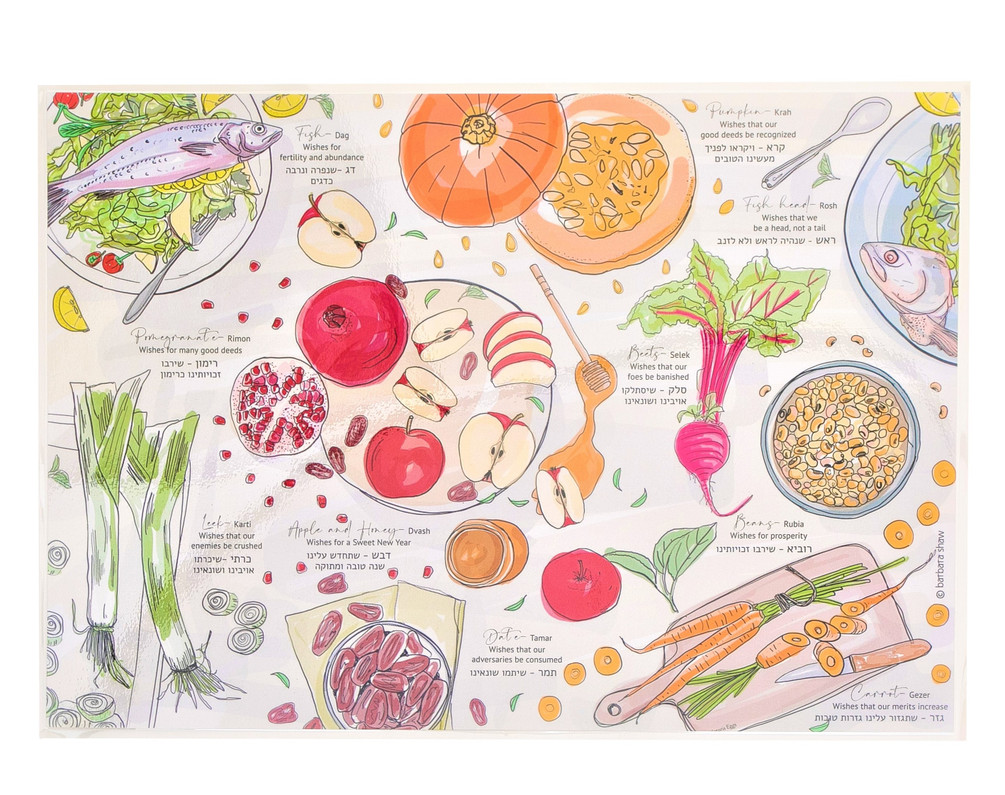Honey ! Why only Apples and Honey? New |Year foods and Gifts
Rosh Hashanah, the Jewish New Year, represents a time for hope and renewal. During the Rosh Hashanah festive meal on both nights, it's customary to eat symbolic foods that express our prayers and hopes for the coming year, accompanied by a short blessing.
These foods are called ‘simanim’ which is
Hebrew for symbol or sign. The most well-known of these special foods is apple dipped in honey and our prayer is for the upcoming year to be renewed as a good and sweet one.

The pomegranate, one of the Seven Fruits of Israel, is another popular fruit eaten on Rosh Hashanah. It is known for its luscious seeds that are believed to correspond with the 613 mitzvot (sacred obligations). The act of eating pomegranate expresses our wish for a year filled with good deeds and mitzvot.do view our Pomegranate themed gift ranges we have runners and challah covers, trivets and towels

We eat some foods whose names are a play on words that reflect our desires. One such example is the carrot, called gezer in Hebrew, and similar to the word g’zar, which means decree. So we eat carrots to express our hope that any negative decrees against us will be nullified.
The memories of past Jewish history and the tragedies that have impacted the Jewish people are never far from consciousness. As we enter the New Year, a time of hope, our prayer is for a peaceful year. It's common for people to eat foods that symbolise this.
We eat dates, praying that God will defeat our enemies and those who wish evil upon us. But like the pomegranate, dates are also one of the seven fruits of Israel. And dates too are sweet like honey.
Beetroots offer the hope our enemies will depart, because the Hebrew word for beetroot is selek, similar to the word for depart. Leek is also a play on the name and related to the word karet, to signify our hope that God will cut off the bad intentions of those who have ill will towards us. Similarly, pumpkin's name is like the words for cut and announce. So we pray for God to tear up any evil decrees against us, and also to announce our merits. Another reason for eating pumpkin is that it has a thick skin that protects it from harm. And in that vein, we wish for Divine protection.
But the overriding theme of Rosh Hashanah’s symbolic foods is one of optimism. Many have the custom of eating black-eyed peas or fenugreek (hilba) symbolising the wish for a year of abundance and that our merits should increase.
As Rosh Hashanah is the head of the year, we consume a symbolic food to represent this - usually the head of a fish. And we pray that we should be like a head and not like a tail.
My dearest sister in law Z'L came from Iran. Their custom was to have a head of a sheep at the Rosh Hashana table. My sons found this quite curious when we saw it on the table!
In the diaspora we tend to only have apples and honey. I have adopted these foods tonthe table and find they add interest for everyone. I invite you to try it.
Wishing you a healthy, happy and sweet new year.
Recent Posts
-
Tips for Non Jews attending a Passover Seder
I’ve been invited to a seder but Im not Jewish – what do I need to know That’ …8th Apr 2025 -
Making the Passover Seder fun for Kids
Passover Pesach – involving the kids: Passover is a festival really aimed at telling the …8th Apr 2025 -
Pesach recipes from Hungary - My mothers tradition
Hungarian cuisine has a rich tradition of Pesach (Passover) recipes, influenced by Ashkenazi customs …26th Mar 2025

